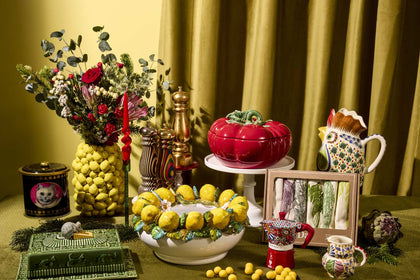How To Clean a Cast Iron Pan
by The Sous Chef Team

Maintaining a clean cast iron pan is essential for preserving its lifespan and ensuring the best results when you cook with it. In this guide, we walk through the very simple steps to help you clean your griddle pan. And keep it rust-free and a joy to use.
We’ll discuss:
- The basic step-by-step guide to keeping cast iron clean
- How to remove rust from a cast iron pan
- How to remove burnt food from a cast iron pan
- How to remove stains from a cast iron pan
- How to clean a cast iron pan, without removing the seasoning
- Can you use salt to clean a cast iron pan?
Sous Chef’s Cast Iron expert Kristin Lohse is our cookware buyer. She has many years of experience using, testing and cooking with the world’s finest pots and pans. She shares her expertise from her long career looking for the very best cast iron pans.
Become a cast iron expert, with our ultimate guide to cast iron pans. And browse all cast iron cookware at Sous Chef.
Steps on how to clean a cast iron pan
-
Cool Down
Allow the cast iron pan to cool completely before cleaning to avoid burns. While waiting, you can focus on preparing your favourite sides or garnishes for the meal!
-
Scrape Residue
Once cooled, use a flat-edged spatula or scraper to skillfully remove any leftover food or debris, ensuring a clean slate once rinsing.
-
Wipe with Paper Towel
After scraping, with a deliberate and thorough approach, wipe the surface with a paper towel, not just for cleanliness but also to assess if any stubborn bits need extra attention.
-
Hot Water Rinse
Conduct a thorough hot water rinse, letting the steam do some of the work in loosening any stubborn residues. Do this step several times for stubborn residues.
-
Mild Soap Application
Apply a small amount of mild dish soap to a soft sponge or cloth, allowing the gentle soap to cut through grease without compromising the seasoned surface.
-
Gentle and Mindful Scrubbing
Embrace the gentle scrubbing process, investing a bit of time and care to ensure that even the trickiest spots receive the attention they need.
-
Rinse Thoroughly
Conduct a comprehensive rinse under hot water, making sure all soap and lingering debris are effectively washed away, leaving your cast iron pan immaculate.
-
Dry Completely
As you towel dry or air-dry the cast iron pan, take a moment to appreciate the satisfaction of a clean pan, proper drying will help you prevent rust in your cast iron pan.
TRY: Read our buyer's guide on cast iron pans and check out our cast iron cookware collection!
How to clean a rusty cast iron pan
Sometimes, you need to clean more than just food from your cast iron pan. Spotting a patch of rust on your cast iron pan can be disheartening. But, fear not! This guide will show you how to remove rust and bring your pan back to life.
This is how to remove rust from a cast iron pan:
- Sprinkle a generous amount of coarse salt over the rusted areas. Cut a potato in half and use it as a scrubber. The moisture from the potato combined with the salt creates a natural abrasive paste. This mixture helps lift rust from the pan.
- After scrubbing, rinse the pan with water to remove any salt residue. It's important to dry the pan immediately and thoroughly. Heat it on the stove to ensure all moisture evaporates.
- Next, you must re-season the pan. Apply a thin layer of oil and heat it in the oven. This process restores the protective coating that prevents rust.
How to clean a burnt cast iron pan
Dealing with stubborn burnt food in a cast iron pan doesn't have to be a chore. Here's a straightforward approach to get your pan looking like new.
- Start by boiling water in the pan. This loosens the burnt bits, making them easier to scrub off. Allow it to simmer for a few minutes, then cool slightly.
- Next, pour out the water and sprinkle coarse salt into the pan. The salt acts as a gentle abrasive, helping to lift the burnt residue without damaging the pan's surface.
- Use a stiff brush or sponge to scrub the pan with the salt. Focus on the burnt areas, applying moderate pressure. The combination of salt and light scrubbing will remove most of the burnt-on food.
- Rinse the pan thoroughly with warm water to remove all salt and loosened bits. Ensure you get rid of any remaining debris to prevent rust.
- Dry the pan completely after washing. You can do this by wiping it with a towel or heating it on the stove over low heat. Remember, leaving moisture on cast iron can lead to rust.
- Finally, apply a thin layer of cooking oil to the pan's surface. This re-seasons the pan and restores its non-stick qualities. Use a paper towel to spread the oil evenly, covering all areas.
How to clean cast iron pan stains
Stains might remain in your cast iron pan after you’ve cleaned any rust off. Some oils might leave a residue of stain, and some foods might also cause discoloration or a patchy, dappled ‘patina’.
- For general stains, warm water and a stiff brush are your first steps. Scrub the pan while it's still warm to loosen any food particles.
- If stains persist, create a paste using water and coarse kosher salt. This paste acts as a gentle abrasive, helping to lift stains without damaging the pan's surface. Apply the paste to the stained area and scrub with a brush or sponge. The salt's texture aids in removing stubborn stains effectively.
- After scrubbing, rinse the pan thoroughly with warm water. It's crucial to remove all salt residues to prevent corrosion. Then, dry the pan completely using a clean towel or by heating it on the stove over low heat. Moisture can lead to rust, so ensure the pan is fully dry before storing.
- Once dry, apply a thin layer of cooking oil to the entire surface of the pan. Use a paper towel to spread the oil evenly. This step helps to re-season the pan, restoring its natural non-stick properties and protecting it from future stains and rust.
With regular care, using these methods, your cast iron pan will remain clean, stain-free, and ready for your next cooking adventure. Remember, the key to cast iron maintenance is prompt cleaning after use and proper seasoning to keep it in optimal condition.
How to clean cast iron without removing seasoning

Keeping your cast iron's seasoning intact while cleaning is simpler than you might think. Here's how to clean effectively without stripping away its well-earned patina.
- Start by using warm water and a brush. Scrub the pan gently after use. This removes food bits while preserving the seasoning. If needed, a small amount of mild dish soap won't harm. Just use sparingly and rinse well.
- For tougher residues, boil water in the pan. The heat helps lift food bits without affecting the seasoning layer. Once boiled, let the water cool slightly, then scrub lightly with a brush.
- After cleaning, dry the pan thoroughly. Moisture is the enemy of cast iron, leading to rust. Use a towel or place the pan on low heat on the stove to ensure it's completely dry.
Finally, apply a light coat of oil. Use a paper towel to rub a thin layer over the entire surface. This step maintains the seasoning and protects the pan until its next use.
How to clean a cast iron skillet with salt
Cleaning your cast iron skillet with salt is an effective, gentle method. Here's how to do it without harming your skillet's seasoning.
- First, while the skillet is still warm, sprinkle a generous amount of coarse kosher salt into it. The warmth helps the salt act as a natural abrasive, making the cleaning process easier.
- Use a folded kitchen towel or a stiff brush to scrub the salt around the skillet. The salt's texture helps lift away food particles and grease without damaging the seasoned surface. This method is particularly useful for tackling stubborn residues without resorting to harsh chemicals or soaps.
- After scrubbing, discard the used salt and rinse the skillet with warm water. It's important to remove all salt to prevent corrosion. Then, dry the skillet thoroughly. This can be done with a clean towel or by placing it on a warm stove to evaporate any remaining moisture.
- Finally, apply a light coat of oil to the skillet. This oil must have a high smoking point. Do not use olive oil! Use a paper towel to spread the oil evenly over the surface, including the bottom and handle. This step helps maintain the skillet's seasoning, ensuring it remains non-stick and rust-free.
By following these steps, your cast iron skillet will be clean, well-maintained, and ready for your next cooking adventure. Regular cleaning with salt is a simple way to extend the life of your skillet while keeping its seasoning intact.
Properly store your cast iron pan

After your cast iron pan has been cleaned and dried, the next step towards ensuring its longevity is proper storage.
Opt for a cool, dry place away from direct sunlight and moisture, as these elements can lead to rust formation.
To prevent scratches and maintain the seasoned surface, consider placing a layer of paper towels or cloth between stacked pans.
Additionally, storing the cast iron pan with a light coating of oil can offer an extra layer of protection against environmental factors. By following these storage practices, you not only preserve the quality of your cast iron pan but also enhance its performance for countless cooking adventures.
https://www.souschef.co.uk/products/cast-iron-grill-pan
Seasoning your cast iron pan
Regularly seasoning your cast iron pan is essential for prolonging its lifespan and maintaining optimal cooking performance.
Seasoning creates a protective layer on the pan's surface, preventing rust formation and enhancing its non-stick properties. This simple yet effective practice not only ensures a longer life for your cast iron pan but also contributes to better-tasting and evenly cooked meals.
Make seasoning a part of your regular maintenance routine to enjoy the full benefits of your cast iron pan for years to come. If you're unsure how to season your cast iron pan, learn more here for a step-by-step guide.
Here at Sous Chef, we have a buyer’s guide on cast iron pan just for you! It includes everything you need to know about cast iron cookware, including the best brands to buy and how to care for your pans to ensure they last forever.

About the author
The Sous Chef team spends all day, every day hunting out the most exciting flavours, trends and recipes from across the world.
Every single team member tastes ingredients weekly, and cooks with the most up-to-date and classic cooking tools regularly. We're experts in ingredients and cookware from around the world.
We are constantly tasting new products, trying new recipes, and speaking to expert producers. For recipes and inspiration from the Sous Chef team, sign up for emails here.


